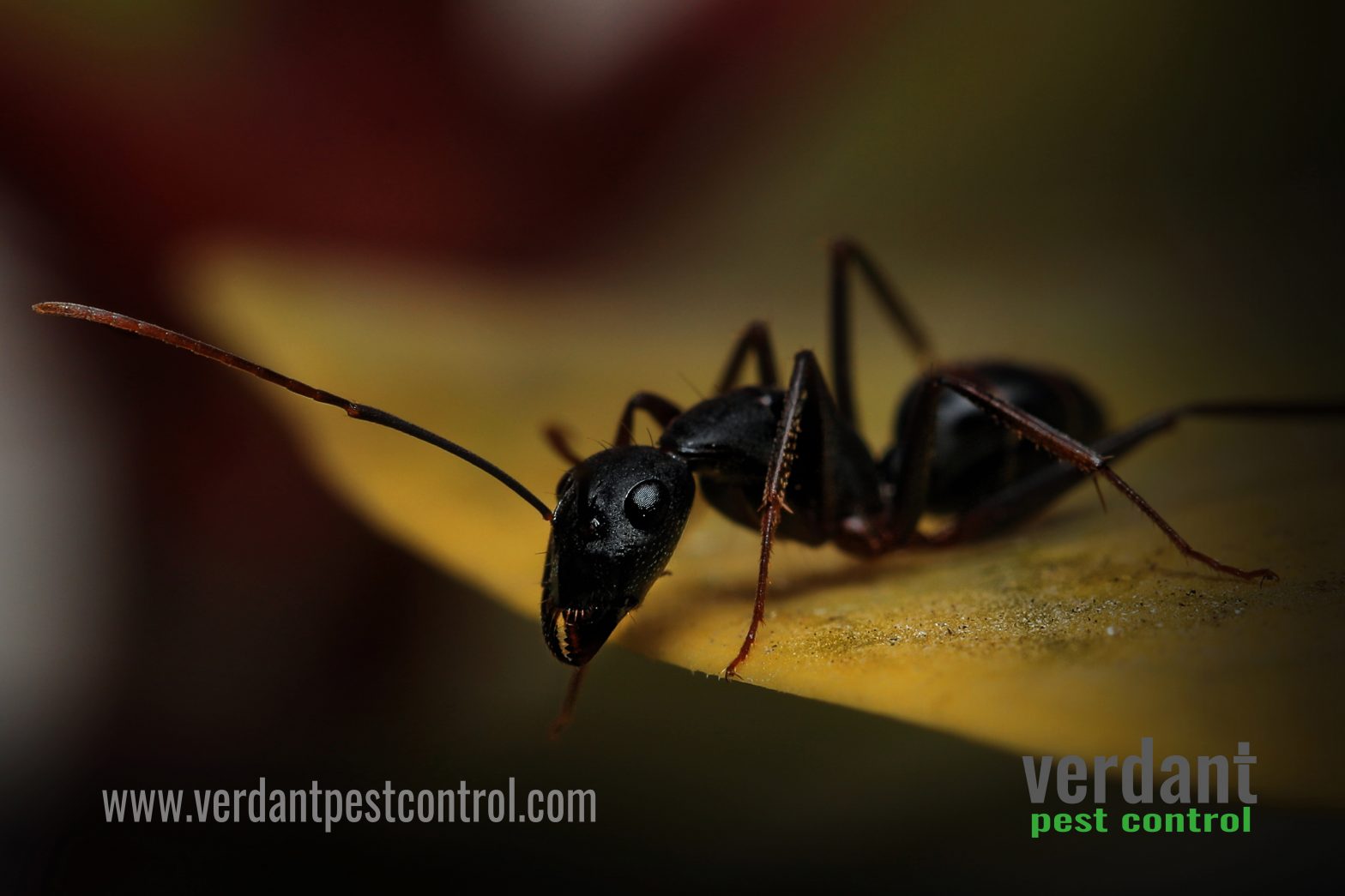Carpenter ants can be a problem inside homes and other buildings anytime of the year, not just when then weather is good. The “when” you are experiencing carpenter ants is very important to how you would eliminate and prevent carpenter ants. An ant problem in January will be handled much differently than an ant issue in August.
Ok, ok I get it…timing is important, so how do I get rid of carpenter ants and prevent their grubby little mitts from getting in my house again?
Let’s look at prevention first, since it’s far easier to prevent than to remediate like most things in life. Start by making taking a walk around the outside of your home. You want to be looking for any gaps, cracks and other points of entry into the structure that ants (and other pests) can use. Gaps around electrical lines, water lines, gas lines, sills and similar can be sealed up by caulking around these areas. Be sure to use a weather/water proof silicone based products to prevent shrinking and deterioration. And of course if you don’t feel comfortable doing something you should hire a professional to do it for you….or youtube it you weekend warrior. Next is making sure all tree limbs and shrubbery is trimmed away from the structure, you don’t want any of it touching the building. When touching, these branches act like roadways directly onto your home. Another disclaimer, if you don’t know what you are doing then call someone. I can’t be held responsible for you killing the bushes around your home after you got snip-happy and decimated every branch within a 4-foot radius. Next, ditch the mulch. Spring time is when everyone likes fresh mulch installed and sometimes humans get lazy and don’t remove the old decaying mulch before installing the good stuff. This is bad for a lot of reasons but in particular it’s because it is rotting wood just laying on the ground against your house….a buffet for wood destroying insects like termites. And yeah sure you can buy treated mulch to help prevent weeds and insects but this opens up another whole can of worms for discussion and before I rant on let’s just agree that mulch is bad for preventing pests. I made a formula for easy remembering (MULCH X PESTS) = BAD. If you are cringing at my makeshift equation i’m sorry but keep in mind we specialize in the removal of pests and not mathematics over here. Ok so no mulch, so what do I use? Crushed stone is your new best friend. It creates a natural barrier that carpenter ants and other pest don’t particularly like to travel over. It also wicks away moisture instead of holding it like a sponge like the bad mulch does. Does crushed stone work 100% of the time? Nope, this is nature and all we are doing is trying to make the path into buildings as cumbersome as possible for pests. Crushed stone, trimmed branches and sealed entry points is going to give you a great start in the war against invading pests.
Lastly, adding a chemical barrier to the aforementioned list will give you maximum prevention. This is where we really can get stuck in the weeds with what product to use, how often and where. For now, lets just keep it simple and say an exterior treatment using a repellent pesticide wether it be traditional or natural is going to significantly help you in staying pest-free.
Fine and dandy but what if I have carpenter ants already? Start by completing the prevention items then if after a few days you see no difference then you should call pest management company to help with remediation of carpenter ants. The reason why I say this is because things can go really wrong fast. Well Antman, what can go wrong? Choosing a pesticide to use is like buying a new car, there are many options and each may get the job done but in very different ways. The wrong pesticide could offer no immediate protection. It might not offer any protection for that pest. Did I mention there are several different formulations for pesticides? Should I use a granule or dust? What’s the difference between a wettable powder and an emulsifiable concentrate? Treating yourself requires you to buy application equipment (a pump sprayer, spreader, bulb duster) and the chemical. You may find these items to be quite pricey, especially now in 2022 where everything costs more. These products are designed to be sold to pest professionals in bulk and to only use for a single job or one season is going to result in extra product that at best is just more costly sitting unused or at worst it expires and then becomes hazardous waste needing proper disposal. I am aware of the ready to use or RTU products you find at the local hardware store so let me walk you down another scenario to further drive the point home to hire a professional… There are ants that are so attuned to incoming threats to their colonies that the mere act of spraying pesticides, bleach, ammonias or any offensive product to eliminate or repel them will trigger a self preservation response. The queen of this colony (Odorous house ants, Pharaoh ants and others) will lay special eggs that will develop into more reproductive ants and not the normal worker ants. Essentially, this one colony with one queen will “bud” into multiple colonies with multiple queens. In a short period of time your ant problem just accelerated into an all out war on ants in your home. Ridding these colonies can take months and months to do. It happens all the time and we are frequently fixing these ant scenarios so it isn’t a tall tale to tell.
To recap, prevention should be done to help keep ants and other pests from gaining easy access into your home or business. Seal up gaps with exterior-rated silicone products, replace mulch with crushed stone and trim back those branches too close for comfort. Your gutters will thank you as well. Remediation of carpenter ants and any ant can be tricky. There are so many factors to consider when the rubber meets the road as far as treatments and to blindly apply pesticides can result in no results or bad results.

